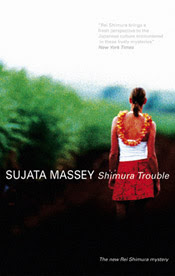

Agatha and Mccavity awards winner Sujata Massey at home.
Sujata Massey writes well researched, entertaining mysteries that feature Japanese-American Rei Shimura, a sleuth at large on a Japanese landscape not usually accessible to westerners. Young, resourceful and sassy, Shimura morphs from English teacher to antiques dealer to international spy with aplomb and wit. Whether revealing aspects Japanese culture as complicated as kaiseki dining and as straightforward as anime drawing, she does it with an outsider's enthusiasm for new territory and an insider's depth and sensitivity. Her cross cultural appeal is cross generational. My daughter led me to the Shimura series and I would hesitate to reccomend it to my mother.
I would say the spirited, curious side; I love to travel and research and meet new people.1. Which part of you, if any, does Rei Shimura represent?
I do wish I felt more comfortably in sync with the places I live; it always seems that only after I leave a place, do I fully appreciate it. I don't think this is a hindrance necessarily. What does hinder me is not having a desire to write about the places where I have permanently lived in the US because I see them as comfortable but rather pedestrian, without any particular history that I feel compelled to explore. The US of course has a fantastic history, it's where you look for it that matters, but I think there are a lot of writers already delving into these topics.2. Both you and Rei Shimura seem to share a sense of dislocation, of not being completely at home anywhere. Is this a hindrance or a help for a writer
I think it is quite common for people with relatives abroad to hunger for those places and to be treated warmly by those relatives, although they may not understand one's "foreign" ways. For instance, in India I eat a lot less than most adults, even though I enjoy the food, and that troubles people.3. While Rei does not feel rooted in either the United States or Japan, her family in both countries anchor and sustain her. Is this contradictory?
I had originally thought my audience would be primarily female, but it's likely 40% male, which is great. I have a lot of teen readers in Europe; I like to think because the education system there is so good! I also have wonderful senior citizen fans who travel a lot and can comment directly on their own experiences in wartime and post-war Japan. These people are treasures whose stories must be recorded.4. Do you have a particular audience in mind when you write?
Two answers to this question. First of all, there are a couple of books in which fashion itself forms the mystery; these might make her seem like a shopaholic, but I was interested in presenting how otherwise people can binge shop. If you read the whole series you will see she wears a lot of vintage clothes from her mother and fleamarkets in Japan, and in the end is sewing her own clothes from vintage yukata kimono fabrics. There is a section of books in the middle of the series--I'd say The Bride's Kimono through The Pearl Diver--which are very much about her relationships with others and growing as a woman. The most likely final book in the series was Shimura Trouble, which came out in 2009--though I reserve the right to pick up and start writing about her again if the fancy strikes.5. Rei has grown from self-involved shopaholic to a more rounded, other-oriented character. What do you foresee for her as you continue the series?
I won once and lost it 3 other times, so I don't think it's played much of a role in my career or the type of books I write. The Agatha is a fan-nominated award based on popular vote, and usually the book's lead character is female, and she doesn't swear and there is no excessive violence. There's also not supposed to be graphic sex in the books, but I've "gotten away with it" in every book, almost!6. You are an Agatha award winner. Does that influence your work?
They are living breathing and have: library cards, relationships with independent booksellers, and B&N and Borders member cards, too!7. Who is your ideal reader?
I think I and every other writer would tell you that they themselves are the critics. The critical self keeps one from stretching, daring, and chancing--which is unfortunate. I fight my inner critic almost daily.8. Who is your toughest critic?
It has definitely slowed down the time I take to write; and has kept me from the book promotion trail. However, it has helped me make choices about what's really important, and I would rather not write, than not have a family. I am thrilled to have both.9. You are balancing family life with a demanding career. How has motherhood affected your professional life?
To write something that changes the way people think.10. If you could have one wish, as writer, what would that be?
Don't know. There have been so many great lines. I usually take a very long time writing the first line and change it two dozen times before going back to the original.11. Joyce Carol Oates sets great store by the opening sentence in a book. What is the opening line in your favorite book?
Rei adores small things, whether it's a cup of tea with an unfolding cherry blossom in it, or a cute phrase on a child's backpack. Little treasures make daily life worth living.12. Mono no aware, translated as the ah-ness of things or a sensitivity to ephemera, is said to be the essence of Japanese beauty aesthetics. How does your Rei Shimura series reflect that ?
She would be happy to take Miss Marple on a tour around Tokyo!13. How does she relate to Miss Marple?
No comments:
Post a Comment